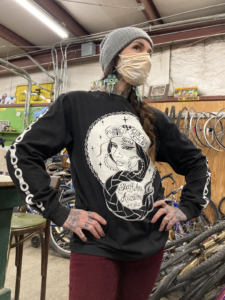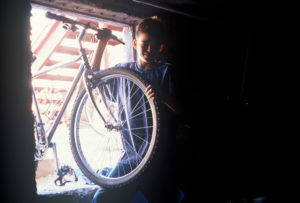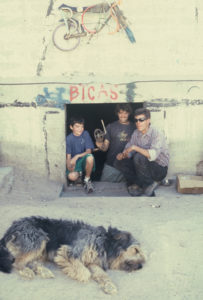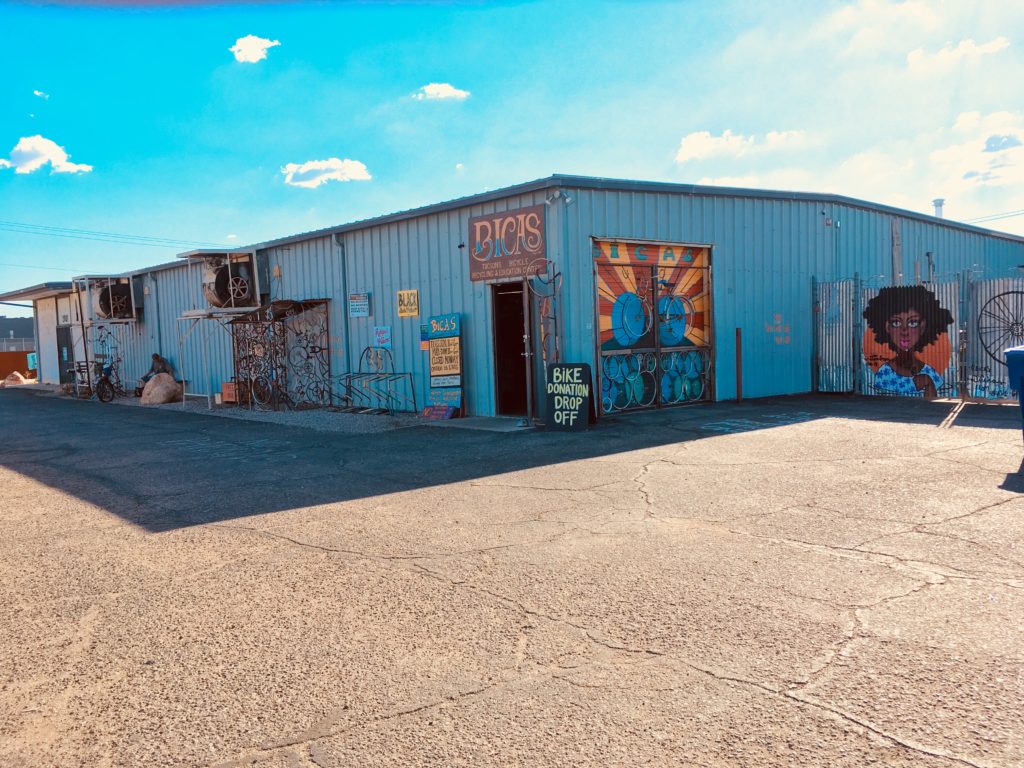BICAS History

Although known in the community as BICAS (Bicycle Inter-Community Art and Salvage), our official name is Bootstraps to Share of Tucson. Our primary project (and in many years our only project) is the community bicycle education center known as BICAS. The early history of Bootstraps, which led organically to the forming of our BICAS project, is given below.
Early beginnings and incorporation, mid 1980s to 1989
Bootstraps to Share had its origins as a group of loosely affiliated individuals in Tucson who drew inspiration from the international Bikes Not Bombs movement. That movement was originally dedicated to providing sustainable, human-powered transportation to communities in developing countries by setting up, in those countries, local community bicycle maintenance spaces and training local bike mechanics, the key idea being the establishment of local self-reliance; but similar needs were soon identified within the U.S. itself, particularly in the inner cities.
The precise date of the forming of the Tucson affiliation remains murky. According to a Bootstraps grant application from 21Oct1995, our Bikes Not Bombs chapter formed in 1983. However, according to histories of Bikes Not Bombs in Massachussetts, they started around 1984 with a purely international focus, and only around 1987 developed similar programs for their local community, subsequently starting about a dozen similar organizations around the United States. (Since their history doesn’t give details, it remains unclear whether the Tucson group was merely inspired by Bikes Not Bombs or was an official chapter of Bikes Not Bombs.) All we can say for certain is that folks in Tucson in the mid 1980s wanted to accomplish something similar.
Bootstraps to Share was incorporated in October 1989 as a non-profit corporation in the State of Arizona. (The non-profit nature was further clarified, in an October 1990 amendment to the Articles of Incorporation, to conform to requirements of federal law, and we obtained federal tax-exempt status as a 501(c)(3) organization in December 1990. Arizona tax-exempt status was obtained in April 1991.) You can read our Articles of Incorporation, and learn more about our tax-exempt status.
In forming Bootstraps to Share, the founders diverged somewhat from their Bikes Not Bombs roots, laying out an ambitious vision of addressing many social issues simultaneously, principally helping homeless individuals obtain housing and income, the latter by employing said individuals in various capacities, such as repairing houses and bicycles.
One of the original incorporators, and actively involved in the organization until 2000, was Kathe B. Padilla, who has started other non-profit organizations, notably Women for Sustainable Technologies and Zambian Children’s Fund.
Almost no mention of “bicycle” in early documents
If pressed for a one-sentence description of the organization back around the time of incorporation, we might proffer the following such description, from our March 1991 application for Arizona tax-exempt status:
Bootstraps to Share is a new organization located in Tucson which creates employment for the homeless and at the same time helps them get a place of their own in which to live.
For a longer description, see the application for federal tax-exempt status (especially the last two pages).
Active use of “bicycle” starting 1992
The word “bicycle”, which is today perhaps the one word associated most with BICAS, is mostly absent from the early documents. It is evident that the founders of Bootstraps had bicycle-related projects in mind, but perhaps as an experiment, and perhaps mostly as a means of earning income for the homeless, rather than an end in itself. For example, the proposed budgets in our federal application do mention “bicycle shop”, but this merely meant the project idea of having homeless individuals earn money by repairing bicycles and building custom bicycle trailers from scrap metal (see our response to an IRS query during the application process).
We first see bicycles mentioned explicitly in mid-1992 in the following statements describing the character of the corporation as part of the 1991 Annual Report to the Arizona Corporation Commission:
Create cottage industries to employ homeless people through the selling and repair of used bicycles; sell used parts; manufacture bicycle trailers from scrap materials.
The “recycle a bicycle” meme first appears in our 1992 Annual Report:
Create cottage industries to employ and empower homeless and working poor. Recycle used bicycles, sell to the public, ship ([as a form of] humanitarian aid) to developing countries.
Focus shifted towards needs in Tucson
As this experiment finding ways to help homeless individuals evolved, it became evident that the homeless population itself has a significant need for recycled bicycles, as well as need for a do-it-yourself repair facility. It further became evident that this need is not limited to homeless individuals. By mid-1994, in our 1993 Annual Report, we start to see our present-day Tucson-focused activities emerge:
Run bike repair programs for at-risk youth; recycle bicycles from the community into our youth programs, to homeless persons, and to developing countries; promote the use of alternative transportation in Tucson; teach bike mechanics.
In particular, this statement indicates the organization to have picked up an additional focus on youth; indeed, our Articles of Incorporation were amended in August 1994 to increase the scope of the organization beyond the homeless to also include youths, emphasizing youth education, and specifically mentioning human powered transportation.
Kim Young and BICAS
Kim Young, who had worked for Bikes Not Bombs in Nicaragua in the late 1980s, got involved in Bootstraps around August 1994 and remained involved until approximately June 2002. During this time she was the principal source of energy and leadership and was officially designated the Director (later co-director with Allen Reilley and Mark Gifford).
As mentioned in an Arizona Daily Star article on April 5th, 1996, the organization started using the name BICAS in early 1996, and Kim Young’s efforts (and later that of Allen Reilley and Mark Gifford) led to increased public participation (particularly youth participation) and thus visibility. As a testament to her leadership, and for establishing the foundation for what BICAS has become today, we often credit Kim Young as the founder of BICAS; nonetheless, we should not forget that the parent organization Bootstraps came into existence many years prior, under the leadership of Kathe Padilla.
Building history and “underground entrance”
The original location of Bootstraps seems to have been Kathe Padilla’s residence. At the time the name “BICAS” came into usage (around April 1996) the location of BICAS was Kim Young’s artist warehouse. By July 1997 BICAS had moved to its current location at 44 W. 6th St.
The original entrance to the basement was through a side window. BICAS was truly “underground”, both figuratively and literally, and the youth bicycle programs were known as the “Youth Bike Underground”. The old entrance is shown in the 1997 video 6th Street and the Tracks, which you can access on our youtube channel. That video also includes interviews with Kim Young and Allen Reilley, among others.
Offshoot projects
Bootstraps is essentially indistinguishable from BICAS. But sometimes there is staff interest in other activities that fit under the rubric of the Bootstraps Articles of Incorporation, and this sometimes leads to a new project, distinct from BICAS, but part of Bootstraps (at least initially until the project gains financial independence and independent legal existence). Examples include the Union of Art and Healing Local No. 8, the El Grupo Youth Cycling Club, and Cyclovia.
Turn of the Millennium
Our website got started in 2001 and has been overhauled a few times since then. Our website archive(coming soon) shows earlier incarnations of the BICAS website.
The operation of BICAS has remained fairly unchanged since Kim Young’s involvement. Naturally the energy and involvement in particular BICAS programs will wax and wane depending on public participation as well as staff interest, lending an evolving character to the organization, but Bootstraps found a niche with the bicycle recycling and education center known as BICAS, fulfilling an important and recognized role in the Tucson community. We expect this project to remain relevant for a long time to come.
“New BICAS”
In the summer of 2017 BICAS realized a longstanding dream of purchasing its own property and relocated to its current building at 2001 N 7th Avenue.
The process began in the early 2000s when the BICAS Collective learned of the downtown developments that would likely alter the area around their previous location. As the future of BICAS seemed unclear, this began BICAS’ search for a new building and the dream to own their own space.
“Our current location has allowed us to thrive and put Tucson on the map with one of the oldest and largest community bike shops in the country, and that is something we are proud of,” said Troy Neiman, a member of the BICAS Collective since 2004. “The new space will have easy access by bike, bus, and car. We will be just a mile north up Stone Avenue. We see it as a jumping off point to do what we could not in our old space. You can expect great things from the new BICAS.”
“While the construction of Downtown Links was a catalyst for our decision to move, we were also beginning to outgrow our current location,” says Kristin McRay, Education Coordinator and Collective member since 2009. The change of setting will provide a more secure future by allowing the nonprofit to continue to meet the community’s current needs even better than before, while also providing an opportunity for dreaming up new possibilities.
BICAS staff, old and new, are grateful for the support of the community, which will always be the cornerstone of any home the bike shop occupies. BICAS’ dedication to a “Do-it-Together” model of bicycle repair has helped them grow into an indispensable resource for the Tucson community. Now a vital piece of our beloved Tucson, BICAS is here to stay.
COVID-19 and Gate Service

The unprecedented public health crisis of COVID-19 has been a tribulation on all of our community. In March 2020, BICAS shut down to protect our collective and community. Yet accessible transportation was needed during such times more than ever, for essential workers to commute and for essential needs of everyone, and our collective sought creative solutions to this need.
We reopened as an emergency service in mid-April for no-contact gate service repairs, offering emergency repairs through our roll-up gate to minimize exposure risk for our customers and staff, and serving 1000 people and repairing 200 bikes in the first month alone. In the summer, we opened our hours earlier to lessen the adversity of waiting beneath the temporary shade structures we constructed outside.
It was during this crisis that opened our Etsy shop to sell merch and salvage parts. Online sale has developed into a tangible part of the Art program in the years since, allowing us to share the mission of the upcycled, transformative art to people beyond Tucson. Rachael Rios’ commemorative shirt from the online Mini Staff Art Auction held in place of our regular Art Auction remains a popular design.
In April 2021, we launched our Public Phased Reopening Plan, welcoming inside a limited capacity of customers to browse and shop with social distancing and spacing. On June 1st 2021, we were able to return to our regular services, including Community Tools, Work Trade, and classes. Gate service remained until July 13th to accommodate those who were unable to be vaccinated and more cautious members of the community.



